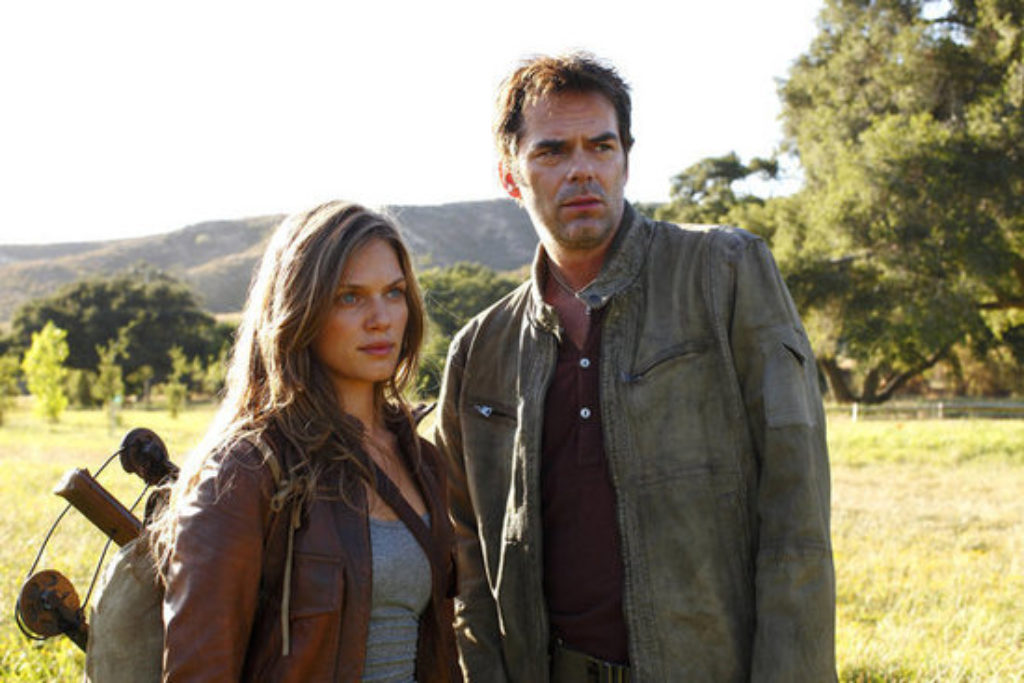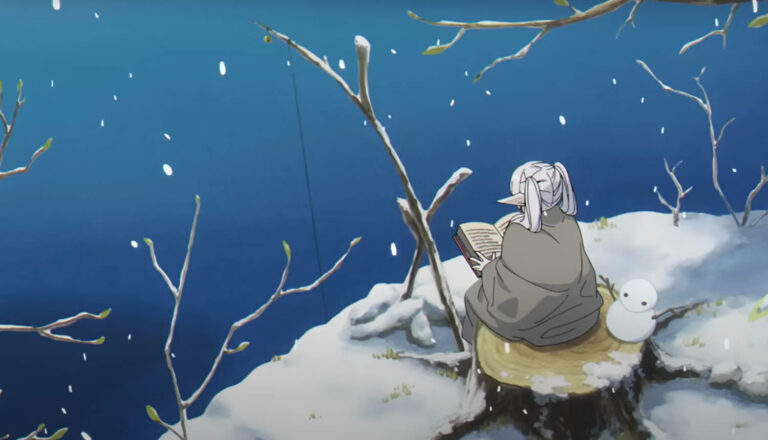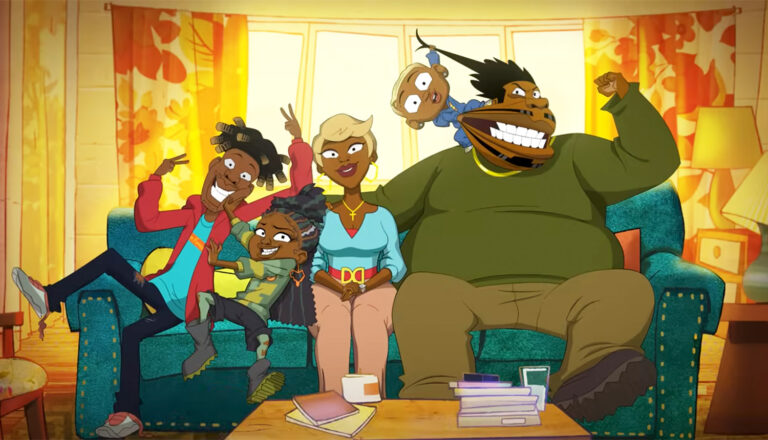
If the world’s power was suddenly shut off by way of some giant breaker box in the sky, we’d all be bummed.
Take, for instance, this review. You would not be able to simply flip on your laptop or phone or whatever and pull these words up from the ether like you used to. Nor would I be able to use a computer to write them. First, I’d have to type the thing out on some sort of rusty manual typewriter (because, trust me, you don’t want to try to read my handwriting), find an ancient hand-crank printing press in order to make a few million copies (humor me here) and then I’d have to walk to all of your houses and personally give you a copy.
Then, once you were done reading, you’d holler after me (as I trudge wearily to the next house) and say, “Hey! TVs don’t even work anymore! What am I supposed to do with this!?”
So we can all be glad we don’t live in the world of NBC’s Revolution.
The setup for yet another freaky serial drama is pretty simple. The power’s out, lots of people are dead and now the survivors must reboot civilization. And while Season 1 is largely about the power itself (What happened? Why? Can we get it back on?), Season 2 ventures deeper into the armed feuds and all-out wars that are the fall-out. And it’s not a very pretty picture of what “civilization” will look like without electricity.
The world—or at least the part of it we can see here, the United States—has splintered into fiefdoms, and most of the countryside is filled with marauding militias or vengeful bandits. A cataclysmic nuclear attack on two splinter nations has winnowed the battlefield a bit, but there are still plenty of groups vying for power—most importantly, perhaps, the Patriots, a group that claims to represent the last remnants of the U.S. government. But there’s doubt about its legitimacy and serious concerns about its methods, which are both barbarous and duplicitous.
This “simpler” world makes for a pretty convoluted ongoing plot. So much so that if I gave you a full rendition of what everybody’s doing in this ensemble drama, it’d be a recitation so full of meanwhiles and therefores that I’d still be writing it next week … right about the time it was all outdated. Little remains constant other than the core characters: Charlie, a pretty teen girl who gets tougher and more calloused with each episode; Miles, her battle-hardened uncle; Rachel, Charlie’s enigmatic mother; Tom Neville, a one-time accountant who’s become one of the toughest hombres anywhere in this brave new world; and, of course, Sebastian Monroe himself—a one-time warlord who seems either on a road to redemption or damnation (depending on the episode).
The brainchild of Eric Kripke and J.J. Abrams (the latter the mind behind Lost, Fringe and Alias), Revolution has both a daunting pedigree (even Iron Man‘s Jon Favreau has shown up in the credits) and high storytelling aspirations—turning itself into a broadcast-TV version of AMC’s The Walking Dead (without all the zombies). This isn’t a throwaway piece of sci-fi escapism. This power-outage drama is predicated on powerful themes: family and country, grace and truth, what should be done and what must be done. Civilization may be half dead, but moral ambiguity is alive and well, the world of Revolution perpetually poised on a knife’s edge, with deep, bloody wounds lacerating its face as it threatens to teeter into Lord of the Flies territory. The show also nods, at times, to more current events, suggesting, perhaps, that our own society differs from this post-apocalyptic one by just a few degrees.
As mentioned, though, the series can turn quite violent for an NBC program, with folks getting graphically cut down by way of blade, crossbow bolt or bullet. We see sprays of blood and gaping wounds; we often hear that squishy wet sound of a knife skewering flesh. Language can be harsh too. And sexual scenes, innuendo and tawdry talk can surface.
There have been times in Revolution’s run where the power has come on, briefly or partially. But despite this, and despite some of the profitable messages in play, its world to be growing ever darker.
“Dead Man Walking”
Monroe kills a Texas Ranger and convinces Miles to frame the Patriots for the murder, hoping to start a war. But someone rats Monroe out: He’s captured and sentenced to death by lethal injection. He does appear to die, but at the end of the episode, Rachel (who mixed the injection drugs) starts digging up his grave.
Tom coerces a Patriot bigwig to lead him to his son, Jason, who’s in a Patriot brainwashing camp. When he finds the young man, he’s determined to rescue him, even after Jason tries to kill him. Tom says, “I have lost d‑‑n near everything in this world, but you are still my son. You are all I have left. So whatever it takes, you are going to come back from this.”
Indeed, messages about family are everywhere in this episode. But so is the blood. Tom cuts somebody’s throat, and the thick red liquid shoots from his victim’s neck. We see a camp filled with flies and dead bodies—the result of a Patriot training mission, Tom’s told. We see only feet, but in Tom’s words, it looks like they were “ripped apart by wolves.” Also: A mother dies while giving birth. Someone falls down a hole and is skewered, dying in a pool of his own blood. People are shot at, hit, kicked and nearly strangled.
We hear some salacious revelations and quips about sex. Characters drink liquor and talk about beer. “D‑‑n” is said a half-dozen times, and is joined by “h‑‑‑,” “b‑‑ch” and “a‑‑.” God’s name is misused a couple of times.
“The Night the Lights Went Out in Georgia”
Monroe’s latest dastardly plan involves triggering a nuclear bomb in Atlanta. Miles and Charlie must try to stop it.
En route, much blood is shed. Someone’s stabbed in the chest and dies. Someone else is shot in the chest and dies. Several people are shot in the head. (One is gunned down right in front of us.) We see punctured foreheads and blood pools. A crossbow dart sinks into a man’s shoulder. A ruffian begins to manhandle Rachel in an effort to rape her. A knife is threateningly held to Miles’ groin. Two people are burned alive from the inside out—thanks to the “magic” of nanite tech. Their skin blisters and smokes before they crumple and die. And note that the woman who kills them says, “Must be what God feels like.”
But self-sacrifice runs deep here too, from Miles and Charlie and Rachel. And also from a woman who forcefully demands (to the point of threatening to take her own life) that her own well-being not be considered when it comes to stopping all the warring by restoring the power. Miles continues to confront his dark and violent past, trying to atone for it in both small and large ways.
We meet two women who share a relationship that’s (just barely) implied to be lesbian. Charlie unbuttons part of her blouse to distract soldiers. Characters say “a‑‑,” “d‑‑n” and “h‑‑‑.” They misuse God’s name a half-dozen times.
“Pilot”
A militia rides into town, shoots Charlie’s dad dead (we see blood spreading on his shirt) and carts off her brother, Danny. With his dying breath, Dad tells Charlie to save her brother and find Uncle Miles. So she hits the road with her small band of tagalongs … and get involved in some nasty, nasty fights all along the way. A dozen or more souls meet their maker in run-ins with swords, knives and arrows.
Danny’s journey is no less fraught. He escapes, he’s captured again, he fights, he’s hit, he bashes a guard with a pipe.
Charlie’s dad isn’t the only casualty of the militia raid. And on the road, Charlie is assaulted. It’s clear that her assailant is planning to rape her before she’s saved and he’s killed with an arrow. (We see him skewered through the torso.) Rachel offers a bottle of poisoned whiskey to the attackers, and two of them die (coughing up blood). Hand-to-hand combat is extended and intense. People are slapped and punched.
Charlie treats both of her parents disrespectfully and insults her stepmom. “She hops into bed with you and that makes her Mom?” she hollers at her dad. Miles muses about drinking himself to death. Profanities include “h‑‑‑” (four or five times) and “b‑‑ch” (once), along with about three misuses of God’s name.


Paul Asay has been part of the Plugged In staff since 2007, watching and reviewing roughly 15 quintillion movies and television shows. He’s written for a number of other publications, too, including Time, The Washington Post and Christianity Today. The author of several books, Paul loves to find spirituality in unexpected places, including popular entertainment, and he loves all things superhero. His vices include James Bond films, Mountain Dew and terrible B-grade movies. He’s married, has two children and a neurotic dog, runs marathons on occasion and hopes to someday own his own tuxedo. Feel free to follow him on Twitter @AsayPaul.

An elf mage contemplates on connection and regret as she watches her human friends grow old and pass away.

Netflix takes a classic sitcom, Good Times, and turns it into a vulgar, violent, sexually-charged TV-MA show.